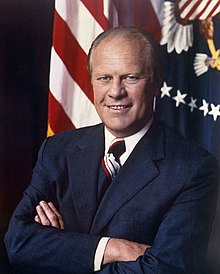
Back Gerald Ford Afrikaans Gerald Ford ALS ጄራልድ ፎርድ Amharic Gerald Ford AN Gerald Ford ANG جيرالد فورد Arabic ڭيرالد فورد ARY جيرالد فورد ARZ Gerald Ford AST Cerald Ford Azerbaijani
Gerald Ford | |
|---|---|
 Official portrait, 1974 | |
| 38th President of the United States | |
| In office August 9, 1974 – January 20, 1977 | |
| Vice President |
|
| Preceded by | Richard Nixon |
| Succeeded by | Jimmy Carter |
| 40th Vice President of the United States | |
| In office December 6, 1973 – August 9, 1974 | |
| President | Richard Nixon |
| Preceded by | Spiro Agnew |
| Succeeded by | Nelson Rockefeller |
| House Minority Leader | |
| In office January 3, 1965 – December 6, 1973 | |
| Whip | Leslie C. Arends |
| Preceded by | Charles A. Halleck |
| Succeeded by | John Jacob Rhodes |
| Leader of the House Republican Conference | |
| In office January 3, 1965 – December 6, 1973 | |
| Preceded by | Charles A. Halleck |
| Succeeded by | John Jacob Rhodes |
| Chair of the House Republican Conference | |
| In office January 3, 1963 – January 3, 1965 | |
| Leader | Charles A. Halleck |
| Preceded by | Charles B. Hoeven |
| Succeeded by | Melvin Laird |
| Member of the U.S. House of Representatives from Michigan's 5th district | |
| In office January 3, 1949 – December 6, 1973 | |
| Preceded by | Bartel J. Jonkman |
| Succeeded by | Richard Vander Veen |
| Personal details | |
| Born | Leslie Lynch King Jr. July 14, 1913 Omaha, Nebraska, U.S. |
| Died | December 26, 2006 (aged 93) Rancho Mirage, California, U.S. |
| Resting place | Gerald R. Ford Presidential Museum |
| Political party | Republican |
| Spouse(s) | |
| Children | |
| Parents | |
| Education | |
| Profession |
|
| Signature | |
| Military service | |
| Allegiance | United States |
| Branch/service | United States Navy |
| Years of service | 1942–1946 |
| Rank | |
| Battles/wars | |
| Awards | |
| module = | |
Gerald Rudolph Ford, Jr. (born Leslie Lynch King, Jr.; July 14, 1913 — December 26, 2006) was an American politician who had served as the 38th president of the United States from 1974 to 1977. Before becoming president, he was the 40th vice president from 1973 to 1974 under Richard Nixon. As a member of the Republican Party, he was also a member of the House of Representatives from 1949 to 1973, becoming its minority leader in 1965. He is the only president who wasn't elected to either office as vice president or president.[1]
Ford was born in Omaha, Nebraska. He attended the University of Michigan and Yale Law School. After Pearl Harbor was attacked in 1941, he joined the U.S. Naval Reserve and served from 1942 to 1946.
Ford began his career in politics in 1949 as the U.S. representative from Michigan's 5th congressional district. In 1965, he became the House Minority Leader. In December 1973, he became the vice president of the United States, replacing Spiro Agnew, who had resigned two months before. This made Ford the first person to become vice president due to the 25th Amendment. In August 1974, Ford became president after Richard Nixon resigned.
As president, Ford signed the Helsinki Accords. It was created to ease tensions between the Western world and the Soviet Union during the Cold War. In 1975, South Vietnam collapsed. This event ended US participation in the Vietnam War.
Domestically, Ford had to work with economic downturn. There was growing inflation and a recession during his presidency.[2] Ford also gave a presidential pardon to his predecessor, Richard Nixon, for his role in the Watergate scandal. The pardon was one of the most controversial things he did as president. Foreign policy was characterized in procedural terms by the bigger role Congress began to play, and by the restraining of the powers of the president.[3]
In 1976, Ford ran for reelection. He defeated former California Governor Ronald Reagan for the Republican nomination. He narrowly lost the presidential election to the Democratic candidate, former Georgia Governor Jimmy Carter.
After his presidency ended in 1977, Ford remained active in the Republican Party. However, his views on some social issues caused disagreement with conservative members of the party in the 1990s and early 2000s, and he was regarded as a moderate. He is ranked average in presidential opinion polls.[4][5][6]
Ford died at home on December 26, 2006 after facing a series of health problems. He was 93 years old.
- ↑ Wright, John (2001). The New York Times Almanac 2002. Routledge. p. 96. ISBN 9781579583484.
- ↑ Frum, David (2000). How We Got Here: The '70s. New York City: Basic Books. pp. xxiii, 301. ISBN 978-0-465-04195-4.
- ↑ George Lenczowski (1990). American Presidents, and the Middle East. Duke University Press. pp. 142–143. ISBN 978-0-8223-0972-7.
- ↑ "Lincoln Wins: Honest Abe tops new presidential survey". CNN. February 16, 2009. Retrieved December 2, 2020.
- ↑ "Presidential Historians Survey 2017". C-SPAN. Retrieved December 2, 2020.
- ↑ "Presidents 2018 Rank by Category" (PDF). Retrieved December 2, 2020.